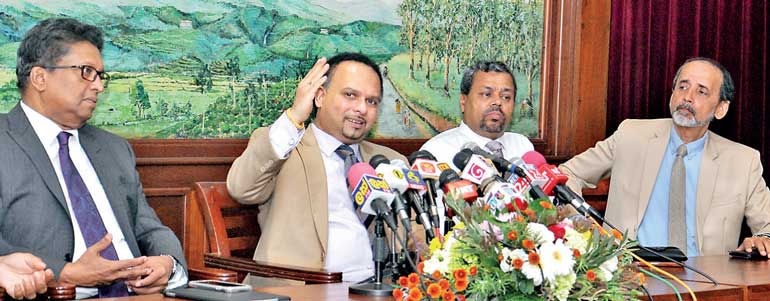Thursday Feb 19, 2026
Thursday Feb 19, 2026
Thursday, 22 March 2018 00:13 - - {{hitsCtrl.values.hits}}
 Plantation Industries Minister Navin Dissanayake gestures at the media briefing yesterday. Others from left are new Sri Lanka Tea Board Chairman W.L.P. Wijewardena, Plantation Industries Ministry Secretary J.A. Ranjith and outgoing Sri Lanka Tea Board Chairman Dr. Rohan Pethiyagoda – Pic by Ruwan Walpola
Plantation Industries Minister Navin Dissanayake gestures at the media briefing yesterday. Others from left are new Sri Lanka Tea Board Chairman W.L.P. Wijewardena, Plantation Industries Ministry Secretary J.A. Ranjith and outgoing Sri Lanka Tea Board Chairman Dr. Rohan Pethiyagoda – Pic by Ruwan Walpola
By Uditha Jayasinghe
The long-awaited Rs. 4.5 billion international marketing campaign for Sri Lanka’s tea industry took a giant leap forward yesterday, with Dentsu Grant signing the agreement to promote Ceylon Tea across 12 countries.
The Rs. 219 million media contract to commence the global marketing campaign was signed at the Sri Lanka Tea Board on Wednesday in the presence of Plantations Minister Navin Dissanayake and other officials. The campaign is expected to help Sri Lanka meet its 2018 target of 320 million kilos and earn an estimated $ 1.65 billion. Tea is Sri Lanka’s largest foreign exchange earner, recording $ 1.53 billion last year.
In 2017, tea crop rose 5% from 292 million kilos to 307 million kilos. On average, auction prices reached $ 4.07 per kilo in 2017 as against $ 3.19 per kilo during 2016, which was markedly higher than the prices fetched at tea auctions in Chittagong, Kolkata and Mombasa. Exports were 289 million kilos and the average price was Rs. 807.44 per kilo. Total exports during 2017 showed a marginal increase of 213,587 kilos over 2016.
Cess collected from each kilo of tea exported was funnelled into a fund since 2011 and will provide the money for the international marketing campaign.
Minister Dissanayake, following the signing ceremony, told the media that he was extremely positive of the move and expressed expectations for a stable 2018 for the tea industry. He also welcomed new Tea Board Chairman W.L.P. Wijewardena and delivered his thanks to outgoing Tea Board Chairman Dr. Rohan Pethiyagoda who resigned in February.
“Ceylon Tea continues to attract a premium in the world market and we are optimistic that the industry can continue to grow in 2018, provided it is not hampered by unscientific and short-sighted policies. Other countries such as Japan and members of the European Union allow for these products and there is no reason why Sri Lanka should not,” Dissanayake said, referring to the glyphosate ban which the industry has been fighting to get reversed.
“Of course these countries are concerned about their health but they still continue to use glyphosate. Commercial agriculture must have a weedicide, otherwise it is impossible to grow economically viable crops on a large scale. It is all relative.”
The Minister outlined plans to present a Cabinet paper calling for glyphosate to be made available to the tea industry. “The Cabinet paper is ready and I will present it to be taken up next Tuesday,” he said.
Agriculture Minister Duminda Dissanayake is also expected to present a Cabinet paper proposing the rolling back of the ban. The restriction on glyphosate has resulted in a thriving black market and the smuggling in of substandard glyphosate into Sri Lanka, the Minister stated.
The ban has also resulted in alternative weedicides with higher levels of toxicity being used by the industry. A recent laboratory report had flagged increased levels of toxicity in Ceylon Tea in exports to Japan, resulting in concerns that Japan would reduce purchase of tea.
“We have conducted tests on samples from all factories and we are confident toxicity levels are now normal,” Dr. Pethiyagoda said. “However if the glyphosate ban is lifted then this problem would be solved.”
He explained that a new weedicide could not be introduced as it needs at least four to six years of testing and glyphosate is accepted in many countries around the world while its alternatives are not. Dr. Pethiyagoda estimates that last year about 20-30 million kilos of extra tea could have been produced resulting in Rs. 16 billion in excess revenue if not for the ban.
The Plantation Ministry has also summoned a meeting with 53 factory representatives next week after they were found to have mixed sugar with tea leaf. The practice is frowned upon because the sugar caramelises substandard tea, giving it the ability to masquerade as quality tea and get prices. Export of substandard tea is a huge threat to Ceylon Tea.
Minister Dissanayake said he would take the strictest action possible but acknowledged that it would have to be balanced by impact on workers who depend on the factories for their livelihoods. Sri Lanka has about 700 tea factories with only a handful of them producing substandard tea. Only about 5% of Sri Lanka’s overall tea production is substandard.
A new testing method devised locally would now be able to do spot tests at tea factories identifying substandard tea immediately, which could lead to a significant reduction, said Dr. Pethiyagoda.
“I want to go by the book. But we must remember that hundreds of people depend on these factories to earn a living and with New Year just around the corner, it will be a very serious thing if these people are left without cash,” the Minister said.
A World Bank report on turning around Regional Plantation Companies (RPCs) will be presented to the Minister later this month and would provide a blueprint on how to make them more profitable.
“RPCs would have to agree on transfer of funds, yield per acre, replanting and other requirements under this effort. We have already split all RPCs into three categories and those in the lowest C segment would especially need to work hard under these measures.”